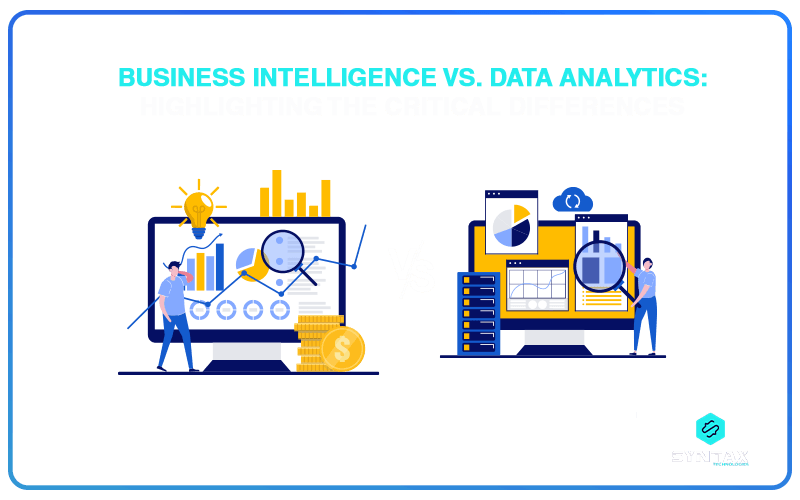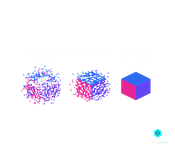There’s definitely a huge opportunity for Businesses to Transform their Operations and Decision Making by using Data. – Jerry Yang
A staggering mass of data is generated on a daily basis, in the course of regular business operations. Consequently, data management solutions have emerged as crucial business strategies for comprehending historical and contemporary data and deriving insights. Data Analytics and Business Analytics are two primary subsets of Business Intelligence, under the overall category of data management. Given so, the distinguishing factors between the different concepts is extremely subtle. The confusion is further aggravated because the different terms are often used interchangeably. However, the interconnected nature of Data Analytics and Business Intelligence does not imply that they are same. The issue of Data Analytics vs. Business Intelligence is out rightly a real one. The differences might be minor; however, to overlook the issue of Business Intelligence vs. Data Analytics is to display lack of technical knowledge.
In this blog, we shall decipher the issue of Business Intelligence vs. Data Analytics. We shall consider the point of similarities as well as undertake a comparative analysis between the two. Consequently, we shall undertake a tripartite comparison on the issue of Business Intelligence vs. Data Science vs. Data Analytics.
What is Business Intelligence?
Business Intelligence or BI is the overarching term which encompasses the process of Data Analytics, along with the activities of data storage, data collection and data management. The objective of BI is to transform raw crude data into meaningful and actionable insights. These insights help in driving the decision making process of the organization. Business Intelligence facilitates creation of performance dashboards, identification of market trends and improvement of every aspect of business.
What is Data Analytics?
As the name suggests, Data Analytics refers to the entire process of analyzing data available to you. It covers the issue of data management as well as deals with the processes, tools and techniques which help in analyzing data. The objective of Data Analytics is to discover unseen trends, valuable correlations and patterns from the data. These discoveries, taken together, add up to meaningful insights which help guide business decisions.
What is Data Science?
Simply put, Data Science is the science of data which deals with structured as well as unstructured data. It is the discipline which strives to make optimum use of algorithm, technology and statistics for conducting the analysis of data, predictive modeling, data mining, machine learning and so on. Data Science can be understood as an amalgamation of several disciplines, like: Mathematics, Statistics, Computer Science, Machine Learning, Information Science and Artificial Intelligence.
Data Analytics vs. Business Intelligence: Elaborating the Differences
In this section, we shall undertake a comparative analysis on the issue of Business Intelligence vs. Big Data Analytics.
- Big Data Analytics vs. Business Intelligence: Difference in Scope
In highlighting the difference between the two ideas of Business Intelligence and Data Analytics, you should remember that in the first place, the scope of the two fields is different. BI revolves around operation and is more concerned with acquiring operational insights. On the other hand, Data Analytics is focussed on conducting different kinds of analyses and is more concerned with innovation. With BI, you build performance dashboards and present results; however, Data Analytics digs deeper and tries to find the causal factors which might have influenced those results. Thus, in terms of scope, while Business Intelligence provides a panoramic picture of business conditions; Data Analytics provides more intricate details of the existing condition.
- Business Intelligence vs. Data Analytics: Nature of Analysis
This line of argument is also summed up as the past vs. the future. In this respect, BI is seen as the discipline which focuses on the past; while Data Analytics is concerned with the future. Unlike Data Analytics, BI happens to be concerned with studying and comprehending data derived from events or situations which have already taken place in the past. Thus, Business Intelligence focuses on Descriptive Analytics. It helps in providing summaries of present and historical data, in order to give a sense of what happened or what is happening. Hence, it is concerned with questions of “what?” and “how?”.
In contrast, Data Analytics, by way of discovering trends and correlations, tries to highlight patterns which are likely to be discovered in future. Thus, Data Analytics focuses on Predictive Modeling. It determines the probability of occurrence of future outcomes through making use of techniques like Machine Learning, Data Mining and so on. Hence, Data Analytics is concerned with the question of “why?” which helps it make precise predictions about the future.
- Business Intelligence vs. Big Data Analytics: Type and Quality of Data
BI is conducted on refined or structured data which is especially prepared for analysis through tools like Tableau and Power BI. Data Analytics deals with structured as well as raw unstructured data. Data Analysts can conduct data analytics on video, audio or text file formats. They often make use of libraries in order to extract structured as well as unstructured information from websites.
Given the type of data involved in both the cases, BI happens to be dependent on Data Warehousing for improving the quality of data. On the other hand, Data Analytics can directly make use of data collected from Data Lakes and other disparate sources. Thus, Data Wrangling is a core part of Data Analytics and not necessarily Business Intelligence.
- Data Analytics vs. Business Intelligence: Math and Statistics
Business Intelligence does not necessarily entail the requirement of core math skills like expertise in probability and linear algebra. Most of the BI tools have specialized features which carry out these commands; however, you will be required to learn platform dependent languages. In contrast, a Data Analyst is required to be proficient in these mathematical skills in order to be able to interpret and evaluate data which might not be possible through customized commands alone.
While Business Intelligence remain largely concerned with Descriptive Statistics in finding the mean, median and average; Data Analytics is all about making use of Descriptive as well as Inferential Statistics for understanding data as well as conducting Predictive Analytics.
- BI vs. Data Analytics: Issue of Coding
Business Intelligence and Data Analytics can be differentiated on the basis of coding requirements. The process of BI can be carried out even without coding as the different Business Intelligence Tools provide simple drag and drop functionality which can be utilized for producing attractive data visualizations. This is not the case with Data Analytics. It entails the usage of different programming languages for the purpose of conducting complex analyses.
- Data Analytics vs. BI: Objectives
On the basis of this argument, it is stated that while Data Analytics is about adding new objectives and goals for the organization to achieve; Business Intelligence is more about accomplishing the objectives and goals which have already been defined by the organization. Since BI is more concerned with past and present data, it is natural for it to lay emphasis on defined goals. On the other hand, Data Analytics, being concerned with future patterns, tries to add more possible achievable goals to the list of future plans of the business organization.
Conclusion
At the end of having undertaken a comparative analysis on the topic of Business Intelligence vs. Data Analytics, it can safely be concluded that the issue of Data Analytics vs. Business Intelligence is very much real. Given the fact that both the concepts happen to closely deal with data as the subject matter, the difference between them is often overlooked. However, as one seeks to acquire technical expertise in these domains, it is important to be absolutely clear on the issue of Business Intelligence vs. Data Analytics vs. Data Science.
We, at Syntax Technologies, provide you with an unparalleled chance of availing the opportunity of developing your understanding of BI as well as Data Analytics, through our top-notched Business Intelligence and Data Analytics course. Enroll now.




